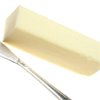Several hours later, as my exhausted mother was scrubbing at the caramelized mess of batter that had cemented itself onto the bottom of our oven, I tried to explain to her what on Earth I had been thinking:
"Well, they're both white," I said.
Baking is a complex chemical process. Everything happens for a reason. I've learned this the hard way a million times. No ingredient is "bad" – they're just different, and they produce different results.
These are the results of experiments I have conducted. Pick your methods based on the cookie you're after. But, please, whatever you do, whatever you're baking, never, ever substitute sugar for flour.
The Experiments (More On the Way):
 | Butter vs. Margarine Summary: Butter allows dough to spread more, producing a flatter, crispier cookie. Margarine holds dough more in its original shape, producing a puffier cookie. Read More . . . |
 | Melted vs. Softened Summary: Results vary. Sometimes melting is safe, sometimes it ends in disaster. Softening the butter, though, always works. Read More . . . |
 | Creaming with an Electric Mixer vs. Beating by Hand Summary: So hard to tell! The dough is definitely more aerated and light with an electric mixer, but the cookie itself seems the same as a hand-mixed one. Read More . . . |
 | Brown Sugar vs. White ("Granulated") Sugar Summary: Brown sugar contains more moisture and so tends to produce a thicker, chewier cookie. Granulated sugar usually produces a crunchier cookie, but results do vary. Read More . . . |
 | Baking Powder vs. Baking Soda Summary: Baking powder produces a puffier cookie; baking soda a flatter cookie. Read More . . . |
 | Melting Butter & Chocolate: Sauce Pan or Microwave? Summary: Saucepan. I think I need to do this experiment again, though - I don't know why the results were so dramatic. Read More . . . |
 | Non-Fat Vs. Full-Fat Yogurt Summary: Full-fat yogurt creates a moister, denser muffin. Non-fat yogurt produces a drier, more aerated muffin. Read More . . . |

1 comment:
I love your experiments! Finally someone to test out the slight changes in cookie recipes rather than giving 'educated' guesses. Your experiment allows a person to really customize a cookie to their specific taste. Thank you, thank you, thank you!
Post a Comment